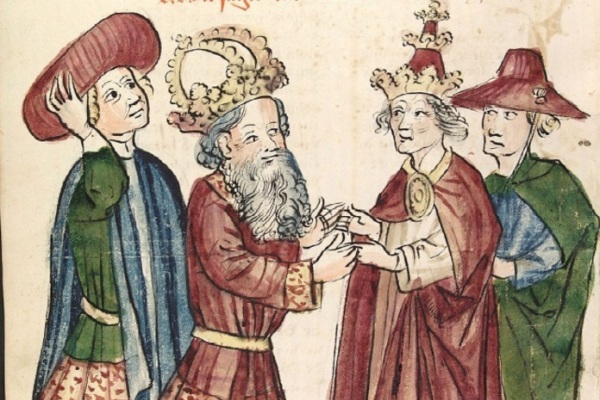Nation of the Cross

In a Middle Eastern Christian village there was a pastor named Joseph. He is a man of middle age who has the energy of someone half his age. He is usually neatly dressed and clean-shaven, but lately he has taken on a more unkempt look—his clothes wrinkled and his face stubbly from shaving neglect. He has strong arms, a long, lean face, uncombed hair, and kind, dark eyes.
When he first heard ISIS was on its way this summer, he went frantically from house to house to warn people that their lives were in danger. Eventually, however, he ran out of time. There were just too many Christians and too few hours left. The roads were crowded from those exiting and it quickly became apparent that not everyone would make it out by the time ISIS made it in.
There was one particular family he knew would probably not make it—a family he loved. I can't imagine what he felt as he went to their door that day.
When he got there, he told the four of them, "When ISIS arrives they will come to your door and they will ask you if you are Christian or Muslim. I would tell them, 'I am a follower of Jesus.'"
Muslims consider Jesus a prophet, so this was a coy bit of advice given to help them stay alive. But there would be no way around ISIS identifying them as members of that country's ancient Christian minority.
Joseph left them with one final word of advice before dashing off to the next group. "If you choose to not convert," he told them, "then just know it will only hurt for a second."
ISIS did indeed arrive before they could flee. That family of four refused to convert as so many thousands have refused to convert. And as so many before them, they were martyred.
Surely, God himself was standing in their honor as that family entered the gates of heaven that day. Just as I believe God was standing in honor when the 21 Egyptian Christians beheaded by ISIS last week entered heaven.
Those 21 were mainly from small Christian towns in Egypt. They had taken jobs in Libya—despite the danger—to provide for their families. Now, because of their faith alone, their families' last images of them will be of them kneeling in orange jumpsuits before their death.
The ISIS-produced video of their murder was entitled, "A message signed with blood to the nation of the cross." It was a message sent to all Christians in all parts of the world, including you.
All over the Middle East—where ISIS roams—we are witnessing the type of faith that most of us only read about in the earliest part of Christian history. Yet the Christian church was hewn on this anvil of persecution. It knows that anvil well, and while in this day we are witnessing its evil in rare form—perhaps in a way we've rarely seen in church history—it is not a new thing but an old thing.
Sacrifice and martyrdom are deeply rooted in Christian identity and Christian theology. Remember, all but one of Jesus' disciples were martyred. The story of the early church is as triumphant as it is blood-laden.
I've seen this commitment to faith again and again as I've learned more and more about the church suffering at the hands of ISIS. Every attempt by ISIS to suppress their faith has only galvanized it. The hatred of ISIS has only made them love more.
The moment I arrived on a visit to Iraq last fall, I asked if we could go immediately to visit the Christian refugees spread across Northern Iraq. The conditions were awful. These people weren't living in tents made for refugees. They were living in makeshift tents pieced together as best as they could. Yet what struck me the most about the tents was not their awful condition, but the crosses accompanying them. One in particular caught my eye, so I went directly to it.
At the entrance of the tent, the family had placed a large cross that reached high into the sky. It's that cross that nearly got them killed. It's that cross that cost them their home and their livelihood, and—almost certainly—the life of someone they loved.
That cross was a burden that they had to bear, and they had every reason in the world to shield themselves from it. Yet the first thing they did when they set up their tent was to make sure everyone knew they still loved that cross.
And the crosses were everywhere among the refugees—on their tents, tattooed on their arms, and hanging around their necks. They have never been so prominent, and to these people, they have never been so important.
In fact, one family snuck back into their village which had been annihilated by ISIS and crawled atop their ancient church to affix again the cross that ISIS had torn down, their faith defying ISIS.
Through their excruciating pain, through the weight of their trauma and their thousand kinds of brokenness, they don't resent the call to suffer that God has put upon their shoulders but rather welcome it. They celebrate it, and they feel honored by it.
This sense of defiance and commitment to Jesus is very much alive in the Middle East among these Christian populations. These refugees—these persecuted sisters and brothers—are indeed proudly part of the "nation of the cross."
Are we?






















